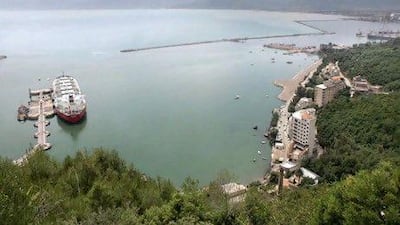Revolution in a small African country with not many resources. An undramatic headline, but the weekend's momentous events in Tunisia will be watched carefully in capitals from Doha to Moscow and Brussels, not least for their potential impact on European energy supplies.
Tunisia itself is not the key concern; the impact of the events on its neighbours is. Though a marginal net exporter of oil, and an importer of gas, all of it from neighbouring Algeria, Tunisia has strategic importance because of its location and its example.
In recent years, Europe has become aware of its uncomfortable dependence on Russian gas. Domestic gas output, mostly from the North Sea, is in decline and imports are growing. Gas, clean-burning and low-carbon, is a vital part of Europe's future energy strategy.
In 2006, 2008 and most seriously 2009, Russia cut deliveries of the gas that it sends to Europe via Ukraine. Ostensibly payment and prices were the cause, but European politicians suspected that Russia was asserting its power over Kiev's pro-western leadership.
This strengthened the case for the EU's "four corridors" strategy. Gas imports to Europe would come from Norway, a safe supplier but with limited room for expansion; Russia, the largest source but less secure; north Africa, primarily Algeria; and Central Asia and the Middle East, via Turkey.
The Turkish route, exemplified by the planned Nabucco pipeline, has made slow progressbecause of the difficulty in lining up suppliers. Of its proposed sources, Azerbaijan, Turkmenistan, Iran and Iraq are all problematic for various reasons. And this puts the focus back on north Africa.
The important TransMed pipeline, opened in 1983, runs from Hassi R'Mel, Algeria's largest gas field, into Tunisia, just south of Tunis, and on to Italy via Sicily. It and the Maghreb-Europe pipeline that connects Hassi R'Mel with Spain via Morocco have been for a long time the mainstays of north African gas exports to Europe.
Advances in technology have made it feasible to lay pipelines in deep water, and so removed the need for transit countries. Consequently, TransMed and Maghreb-Europe were joined in 2004 by Greenstream, which heads from Libya through water depths of more than a kilometre, directly to Italy. Another Algerian pipeline, Medgaz, runs directly from Algeria to Almeria in Spain. Finally, the proposed Galsi pipeline is intended to link Algeria to mainland Italy via the island of Sardinia.
Algeria supplies about 20 per cent of Europe's gas imports. It also exports liquefied natural gas (LNG), and is a significant oil producer whose light, low-sulphur crude is highly prized by refineries.
As for the other north African states, Libya is, of course, a major oil exporter, and a moderately significant gas supplier via Greenstream and one ancient, creaking LNG plant. Complaints over rises in the price of basic commodities, and wider discontent over unemployment and poor living standards, have triggered rioting and discontent in Algeria and Egypt as well as Tunisia. The concern in some capitals is whether the Tunisian scenario could spread.
However, it is worth remembering that even during Algeria's bloody civil war during the 1990s, in which some 160,000 people died, oil and gas exports were not affected. As the major source of government revenue, it is unlikely that any disturbance would cut off energy exports or transit.
From Europe's point of view, any disturbances now would have comparatively little impact. The continent's gas consumption, hit hard by the recession, fell 10 per cent in 2009. At the same time, new LNG supplies, which can be delivered anywhere that there is a suitable terminal, rose by a quarter, as buyers enjoyed new options.
In response to low prices and oversupplied markets, Algeria has slowed the commissioning of Medgaz, originally intended to start deliveries last summer, and put back Galsi to 2014. Similarly, Qatar shut down its new LNG plants for lengthy "maintenance" programmes. This substantial spare capacity could be reactivated to fill any shortfall.
The longer-term picture is more interesting. Bureaucracy, policy indecision, intra-elite infighting and the state's heavy hand have stifled the energy sector in Algeria and Libya. Ironically, Tunisia's and Egypt's energy sectors are relatively open and have reaped the rewards of foreign investment.
The best hope for Europeans as well as north Africans would be for Algeria and Libya to pursue liberalisation as an antidote to slow growth, youth discontent and unemployment. Developing modern, diversified economies, less reliant on the golden eggs of oil and gas, would help de-politicise the arguments pitting foreign energy investment against national resource sovereignty.
Of course, in the short term, governments wrestling to stay in power are unlikely to give attention to new energy initiatives. But in the longer term, more open political systems, or even a Chinese-style path of economic reform without democracy, are more promising to European energy security than crony capitalism or sclerotic autocracies.
Robin M. Mills is an energy economist based in Dubai, and author ofThe Myth of the Oil CrisisandCapturing Carbon


